Steven Grant’s had a number of interesting thoughts in comments, so I thought I’d highlight them. One here.
Derik, I have to agree with Russ on the subject of crap. Maybe not in the ’40s when half a million publishers published & just getting bodies to fill the pages was a pain & a half, but by the ’60s, the field had shrunk pretty severely, & most of the companies left, while they were more than happy to publish crap & probably figured it was exactly what comics should be, on a craft level generally demanded a certain level of quality in their crap. Basic things, like reasonably good anatomy in the art. Sure, there were REALLY crappy exceptions (ibid) but in general there were at least minimal demands of quality put on even crap.
In the ’80s, particularly as a result of the b&w balloon, though it was trending that way by then already, & due to the influx of a number of distributors looking for ANYTHING at all to sell, a gazillion new publishers & self-publishers came into the field, with the result that the main standard for comics stories was that they filled a sufficient number of pages. Due to rampant speculation by hordes of people not wanting to miss out on being able to cash in on the next Teenage Mutant Ninja Turtles, a lot of that really bad work sold really well, for awhile, with the notion getting in the heads of even Marvel & DC that nobody really much gave a rat’s ass about quality so there was less pressure on them to worry about it. Plus those books created a whole new peninsula of writers, artists & editors who called themselves “professionals” & they migrated to other companies as well, with the marketplace lessons they’d learned. Sure, there was as great a ratio of crap published in the ’60s as in the ’80s, maybe a greater ratio as the really good stuff in the ’60s was arguably not as good or at least as numerous as the really good stuff in the ’80s, but the general quality level of crap in the ’60s was, as I’m sure Russ meant, enforced at a much higher level than it was in the ’80s.
Or maybe I was just more forgiving of comics in the ’60s, when I was much younger. I concede that’s always a possibility.
And more here.
As far as having skills & wanting to work in a commercial field, there are good reasons to prefer working in comics to other fields, whether you’re a writer or an artist. Money is generally not one of them, but on purely aesthetic & emotional grounds, comics can be considerably more rewarding, personal & far less pressure & demand than, say, advertising, or television, or writing novels, or commercial photography, etc. I wouldn’t argue against doing comics if you like doing comics. I would argue against it if you don’t care about comics but want lots of money, or fame, or whatever else. I would probably argue against being exclusive to comics, as it’s always safer to keep your fingers in various pies, esp. if you’re a freelancer. Working in several fields isn’t exactly having a safety net, but working in only one – unless you’re very, very lucky – can be like not even having a tightrope.
An image from “Space Man,” by Jack Sparling, the merits of whose art are debated in the thread from which I’ve pulled Steven’s quotes. HT Mike Hunter for the image.

why its another somewhat vague diatribe on how comics suck, who could have predicted that?
Uh…except for the part where Steven then talks about why comics is still a good venue for artists to work in….
Comics both suck and are great: Where else can you look at amazing cartooning, illustration, and dramatic visual storytelling while being subjected to stories that mostly amount to filler or worse? Exceptions tend to prove the rule in the medium.